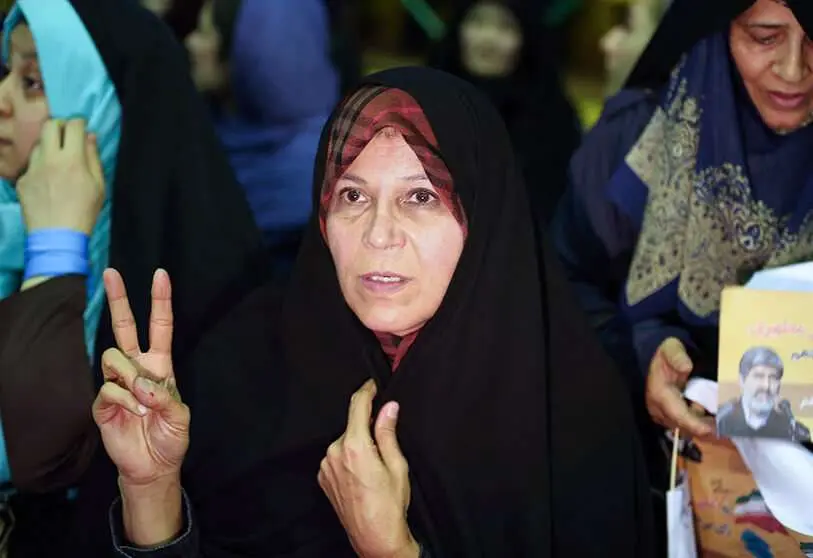Iran sentences Faezeh Hashemi, daughter of former president Rafsanjani, to five years in prison

Iranian activist and former MP Faezeh Hashemi, daughter of former president Ali Akbar Hashemi Rafsanjani, has been sentenced to five years in prison for "propaganda" and acts against national security, according to her lawyer Neda Shams. However, as she noted on Twitter, "the sentence is not final" and she will appeal the verdict within the time allowed by law.
Hashemi, 60, has been charged with "disturbing public order by participating in illegal gatherings". However, this is not the first time she has faced such charges. In 2012 she was arrested and sentenced to six months in jail for "propaganda against the Islamic Republic". In that year the authorities also banned her from participating in political activities.
Everywhere in #Tehran, the chants of “Down with dictator” are heard. This footage comes from Tehran’s metro ?.
— Masih Alinejad ?️ (@AlinejadMasih) January 8, 2023
The regime has been trying to scare people into silence through executions, but Iranians are only getting more emboldened#IranRevolution
pic.twitter.com/3frXdn4IMM
In 2022 a Tehran prosecutor again charged her with "propaganda against the system" and in September, following the start of protests over the murder of young Kurdish woman Mahsa Amini, Hashemi was arrested for "inciting unrest" in the capital, Reuters reports.
The activist's father, former President Rafsanjani, was one of the founders of today's Islamic Republic. During his term in office from 1989 to 1997, he advocated mending ties with the West, a move that provoked domestic criticism.
After weeks of harsh torture, Saeed Yaghoubi, Saleh Mirhashmi and Majid Kazemi are sentenced to death, based on false and fabricated charges. pic.twitter.com/ztqHy1SG3O
— 1500tasvir_en (@1500tasvir_en) January 10, 2023
Hashemi joins a long list of people condemned by the regime since the protests began. The list of people killed and sentenced to death is also long. According to figures from Iran Human Rights, at least 481 protesters have been killed during the protests, while 109 are at risk of execution.
?????
— Yashar Ali ? یاشار (@yashar) January 9, 2023
Mohammad Ghobadlou and Mohammad Boroughani are at imminent risk of execution by the Islamic Republic!!! pic.twitter.com/8sXRtmHqPH
So far, the authorities have already executed four men since December: Mohsen Shekari (23 years old), Majidreza Rahnavard (23 years old), Mohammad Mehdi Karami (22 years old) and Seyed Mohammad Hosseini (39 years old). The regime accused them of attacking security officials in unlawful trials. During their detention they were subjected to brutal torture.
#MohsenShekari 23 ans,serveur de café, #MajidrezaRahnavard 22 ans,ouvrier dans un magasin de fruits et légumes #SeyedMohammadHosseini 39 ans ouvrier dans une usine de taille de pierre #MohamadMehdiKarami 22 ans fils d’un marchand à la sauvette sont les manifestants exécutés. ?? pic.twitter.com/kAGeOtKtPk
— lettres de Teheran (@LettresTeheran) January 8, 2023
As Seyed Mohammad Hosseini's lawyer recounted, his client was beaten with his hands and legs tied and blindfolded. "He received kicks to the head that made him lose consciousness, blows to the soles of his feet with an iron bar and electric shocks to different parts of his body," added the lawyer, Ali Sharifzadeh.
Mohammad Mehdi Karami was executed in Iran this weekend.
— IranHumanRights.org (@ICHRI) January 9, 2023
His family’s pain is palpable.⁰⁰He was denied due process by the kangaroo court that condemned him after being arrested at #IranProtests.
He was 22. #StopExecutionsinIran https://t.co/0Bp9rIeDty pic.twitter.com/hmM55xqeZs
Despite international criticism, the Iranian regime continues to sentence more citizens to death. In fact, young Mohammad Ghobadlou and Mohammad Boroughani, aged 22 and 19 respectively, could be the next to be killed by the authorities. Iran's Supreme Court upheld their sentence a few days ago, the step before the executions.
In order to prevent their death, dozens of people moved outside Karaj prison, near Tehran. Relatives and demonstrators called for the release of the young men while shouting slogans against the Ayatollahs' regime.
#BREAKING: People have gathered in front of #RajaiShahr prison of #Karaj to prevent execution of two more protesters who are #MohammadGhobadlu, 22, and #MohamadBroghani, 19. They both were transferred to solitary confinement to be executed today. #MahsaAmini #IranRevolution https://t.co/3i1jrg2Dip pic.twitter.com/6FZvQiVznV
— Babak Taghvaee - The Crisis Watch (@BabakTaghvaee1) January 9, 2023
Iranians in exile continue to organise protests against the regime, supporting and giving a voice to their compatriots and demanding that Western governments cut ties with the Islamic Republic of Iran. Despite international condemnation, no country has gone so far as to take the decision, as Iranians are demanding. Nations such as the Netherlands and Italy have recalled the Iranian ambassador for consultations, while others such as Germany and the UK are preparing new sanctions packages or considering designating the Revolutionary Guard as a terrorist group.
TV news networks should turn their attention to #Iran where there is a protest outside Rajai-Shahr Prison where mother of #MohammadGhobadlou, who is at imminent risk of execution at 22, is pleading for his life at 3AM. This coverage can save lives. pic.twitter.com/sNTu9niZUt
— Jason Brodsky (@JasonMBrodsky) January 9, 2023
Canadian President Justin Trudeau is one of the Western leaders who has been most engaged with the Iranian people. Trudeau has attended demonstrations organised by Iranians living in Canada and has approved significant sanctions against Tehran's military and political elite.
Three years ago today, Flight PS752 was shot down by Iranian missiles. With it, 176 people lost their lives – people who were loved, and people who are missed every day. We’ll keep working to get their families the justice they deserve. pic.twitter.com/oMhBGSTz8Q
— Justin Trudeau (@JustinTrudeau) January 9, 2023
Meanwhile, French President Emmanuel Macron invited four Iranian activists to the Elysee. Among them was Roya Piraei, whose mother died in the protests, and the well-known journalist Masih Alinejad, famous for launching a campaign encouraging Iranian women to remove the hijab. From the headquarters of the French presidency, Macron gave an interview to French public radio with the activists.








